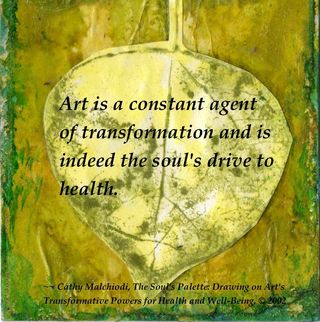Post-Traumatic Growth
Expressive Arts Therapies and Posttraumatic Growth
Expressive arts are changing the story of recovery.
Posted September 27, 2016

In its simplest sense, posttraumatic growth is a positive change experienced by some individuals as a result of a traumatic event or major crisis. While the idea of posttraumatic growth is found throughout human history particularly within spiritual traditions, literature and philosophy, it is an experience that contemporary psychology is investigating for its role in trauma recovery and health.
The Posttraumatic Growth Research Group at the Department of Psychology, University of North Carolina has identified five general areas that constitute forms of posttraumatic growth:
- Individuals facing major life crises may develop a sense that new opportunities have emerged from the struggle, opening up possibilities that were not present before;
- Some individuals experience a change in relationships, including closer relationships with others who suffer crises or trauma.
- Some individuals experience an increased sense of one’s own strength – “If I lived through that, I can face anything”.
- Some people experience a greater appreciation for life in general.
- Some individuals experience a deepening of their spiritual lives; this can result in a significant change in one’s own belief system.
Sometimes the best way, however, to learn about posttraumatic growth is via those individuals who are manifesting it. The Combat Hippies are one of a growing number of veteran-driven groups that are embracing the expressive arts as a pathway not only to emotional reparation, but also as a way to change the narrative of posttraumatic stress disorder. Led by theater artist and director Teo Castellanos, this group of military veteran performing artists is using poetry and performance to tell the stories of their lives as well as transform how the public perceives returning military beyond the stereotype of posttraumatic stress disorder [PTSD]. According to their website, The Combat Hippies were born as a result of a veterans’ initiative in which they shared their experiences in an original spoken word piece as part of the O’ Miami Poetry Festival. The piece, featuring solo and group work, was debuted under the title “Conscience Under Fire” [see short film below]. To me, this group is a living demonstration of the power of the arts to tell the story of how survivors become thrivers and rescript the narrative of PTSD to one of posttraumatic growth as well as “posttraumatic possibility.”
In past postings (see "Reauthoring the Dominant Narrative of Illness"), I have presented the idea that the creative process involved in the expressive arts therapies often provides something that is not clearly categorized as a psychosocial, rehabilitative or health-giving experience. In brief, the expressive arts provide individuals with the chance to re-author the dominant narrative of their challenges as well as a way to explore what is referred to as “posttraumatic growth.” For some, this is a way to find meaning and express the stories trauma, survivorship and “thriver-ship.” Artistic expression as well as expressive arts therapies can be pathways for transforming feelings and perceptions into a new life stories and, as a result, creating a new sense of self. This “re-authoring” of one’s life story may be different for each person and often includes one or more of the following aspects: development of new outlooks; discovery of answers to the unanswered questions; revisions in the way one lives life; creation of solutions or a resolutions to personal struggles; creation of a new “post-illness” identity; or discovery of an explanation for why one’s life has been altered by illness, disability, trauma or loss. Ultimately, the creative process involved in the arts is a form of “meaning-making” that can be powerfully transformational in not only an individual’s adjustment to life’s challenges, but also profoundly inspirational in changing the narrative to one of hope and health.
Cathy Malchiodi, PhD
©2016 Cathy Malchiodi
The Combat Hippies [read more and/or book a performance at http://thecombathippies.com]
What is Posttraumatic Growth? https://ptgi.uncc.edu/what-is-ptg/
Posttraumatic Growth Publications https://ptgi.uncc.edu/publications/


